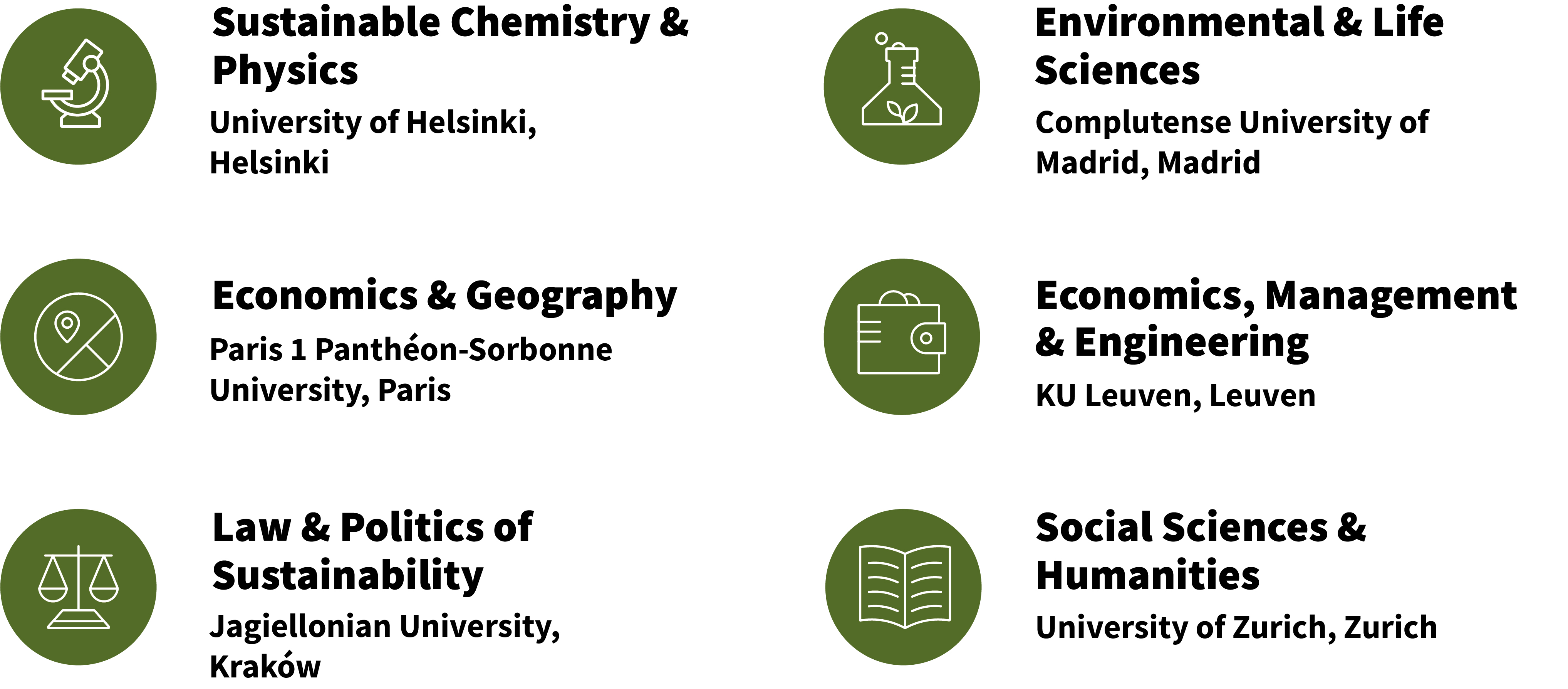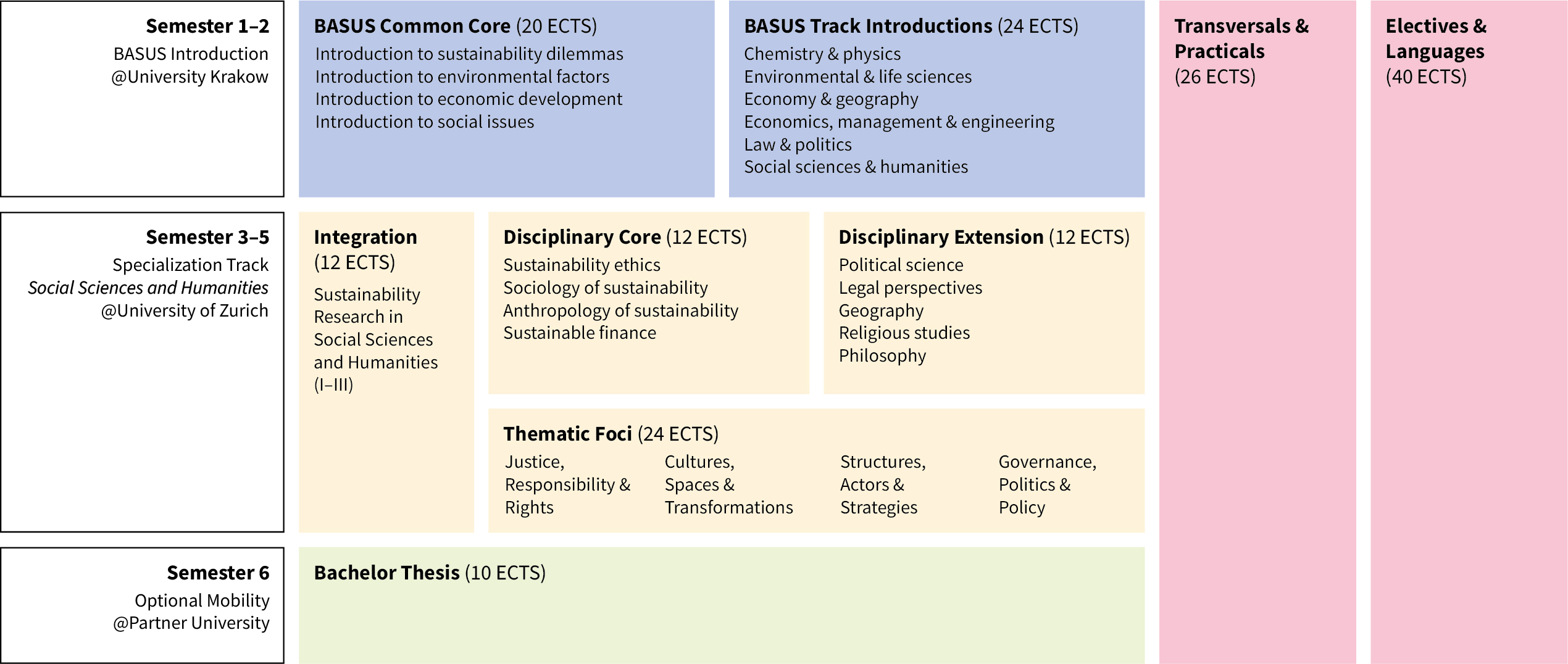Bachelor in Sustainabilty (BASUS)

Table of contents
What is BASUS?
Are you ready to explore sustainability beyond slogans and buzzwords—to truly understand why creating a sustainable future is both challenging and essential? The Bachelor in Sustainability (BASUS) is Europe's first international joint degree designed specifically for students who want to unravel the complex social, economic, and environmental dimensions shaping today's world. A joint degree offered by eight leading European universities, BASUS immerses you in a unique interdisciplinary and intercultural study experience that combines innovative teaching methods and collaborative learning environments to understand and address pressing sustainability challenges.
All students begin their first year with a common introductory phase at the Jagiellonian University in Krakow, Poland, following a specialization track at one of the partner universities in the second and third year.

The University of Zurich (UZH) offers the Social Sciences and Humanities track, which provides students with a strong interdisciplinary foundation in the subject, integrating a range of disciplines, including sociology, anthropology, ethics and finance. Students address key questions such as
- Why do some societies successfully transition towards sustainability, while others struggle?
- What role do culture, politics, and economics play in shaping sustainable outcomes?
- How can different actors actively contribute to meaningful sustainability transitions?
Through research-based courses that address real-world sustainability challenges and a wide range of disciplinary and thematic specialization options, students can tailor their studies to academic or practice-oriented career paths.
Is BASUS the right program for you?
This program is a great fit if you...
- Want to see sustainability as more than just a buzzword and recognize it as a complex issue involving society, politics, and economics.
- Are curious about how societies function, eager to question why existing systems are often unsustainable, and motivated to explore solutions for a more just and sustainable future.
- Want to understand how social scientists contribute to sustainability alongside environmental engineers, activists, businesses, and policymakers — and how collaboration leads to more effective solutions.
- Want a degree that combines theoretical knowledge with practical tools, empowering you to become an active “change agent” for sustainability.
- Are excited about an interdisciplinary and international study experience that takes you to multiple universities across Europe.
If this sounds like you, BASUS is your program!
What makes BASUS unique?
- International study experience: BASUS is Europe’s first international joint degree program in sustainability. Six leading European universities collaborate to award the "Bachelor in Sustainability" degree. As a BASUS student, you may study at up to three of these universities and additionally benefit from faculty exchanges between the institutions involved.
- Interdisciplinary teaching and learning: BASUS provides a broad yet in-depth understanding of sustainability. During the first year, you will be introduced to a variety of disciplinary perspectives on sustainability. Starting in the second year, you will develop a distinct profile in the disciplines that make up your specialization track.
- Excellent career prospects: By combining a research focus with practical experience, BASUS empowers you to become a knowledgeable and effective change agent. This opens up career opportunities in sustainability management, policy consulting, non-governmental organizations (NGOs), international organizations, journalism, and academia. Since the degree is recognized across Europe, a wide range of master's programs are available to you.
How is the BASUS program structured?
BASUS is a three-year undergraduate program divided into six semesters (180 ECTS).
You will spend semester 1 and 2 at the Jagiellonian University in Krakow, Poland, where you study a broad interdisciplinary curriculum that consists of two elements:
- BASUS Common Core (20 ECTS): Problem-oriented introduction to current sustainability issues, including envi-ronmental, economic and social issues as well as sustainability dilemmas.
- BASUS Track Introductions (24 ECTS): Foundational courses that explore the different perspectives on sustaina-bility associated with the six specialization tracks of BASUS and provide orientation for track selection.
For semesters 3, 4, and 5, you will go to one of the six partner universities to study a specialization track. The specialization track “Social Sciences and Humanities” at University of Zurich consists of the following areas:
- Disciplinary Core (12 ECTS): Foundational courses in sustainability ethics, anthropology, sociology, and finance.
- Disciplinary Extensions (12 ECTS): Courses from complementary disciplines such as law, geography, history, and philosophy.
- Thematic Foci (24 ECTS): In-depth study of specific sustainability themes in four foci:
- Justice, Responsibility & Rights;
- Cultures, Spaces & Transformations;
- Structures, Actors & Strategies; and
- Governance, Politics & Policy.
- Integration (12 ECTS): A series of research-oriented courses on inter- and transdisciplinary methods and applications, which bring together BASUS students from the respective cohort.
In semester 6, you will write your Bachelor Thesis (10 ECTS). For this, you can either stay at your track university or spend a mobility semester at one of the other five partner universities.
Two overarching components accompany you throughout your studies, from semesters 1 to 6:
- Electives & Languages (26 ECTS): Free choice of disciplinary and interdisciplinary courses to sharpen and broaden your academic profile within or beyond the specialization track. Electives also include language courses.
- Transversals & Practicals (40 ECTS): Develop essential academic, professional and social skills, such as programming, project management, and science communication.
Here is a structured overview of the BASUS program with a focus on the Social Sciences and Humanities specialization track offered at UZH.
What can I do after completing the BASUS?
In the BASUS program, you will gain the knowledge and skills necessary to understand and help shape a more sustainable world. In the specialization track at the University of Zurich, you will approach sustainability from diverse humanities and social science perspectives, developing a theoretically and methodologically sound understanding of how interrelated sustainability challenges can be analyzed and addressed in practice. Rather than offering simple answers, the track trains you to ask better questions and to navigate complex issues with curiosity, competence, confidence and care. Along the way, you’ll have the chance to explore the role you want to play in sustainability after graduation, whether as a future researcher, strategist, communicator, or change agent. In short, BASUS equips you with a versatile skill set that helps you pursue your interests and future goals on your academic and professional pathways.
Academic prospects
By combining strong disciplinary foundations with a broadly defined elective area, the BASUS “Social Sciences and Humanities Track” opens a variety of opportunities to advance your academic training in different kinds of master's programs. Please note that each master's program has its own admission requirements, so it’s important to align your electives and specializations accordingly to prepare you for:
- Disciplinary master's programs in the social sciences, such as political science, anthropology or sociology.
- Interdisciplinary master's programs in fields like sustainable development, development studies, European and global studies.
Professional prospects
By combining broad theoretical, methodical and empirical knowledge with advanced practical skills, the BASUS “Social Sciences and Humanities Track" opens a wide range of opportunities to start a professional career.
- Entry-level positions or internships in NGOs, international organizations, or policy institutions.
- Roles in communications, journalism, or sustainability consulting and strategy.
What else should I know about the program?
Tuition fees
- EU/EEA Students: EUR 2,000/year
- Non-EU/EEA Students: EUR 6,900/year
Application
- Check the application requirements here.
Admission
Admission is based on an online entrance exam, taking place in the second half of June (exact date announced after application)
Program start
The program will begin in mid-September 2025 in Krakow, Poland.
Teaching Language
English (formal certification required for application)
For more details, visit the BASUS website
